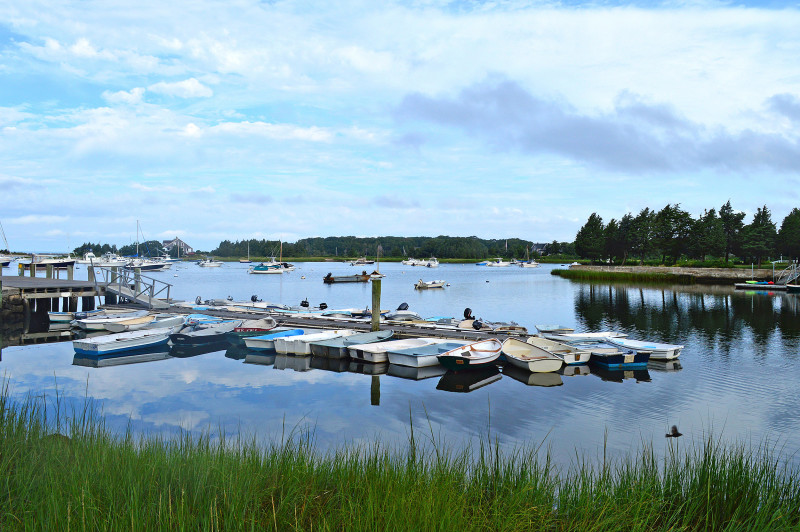Coalition completes installation of nitrogen-reducing septic systems in West Falmouth for major demonstration project
After four years of concerted effort, West Falmouth Harbor now offers a model for reducing pollution from septic systems that could be replicated in other communities. In fact, it is already inspiring action.
 This summer, the Buzzards Bay Coalition completed a project begun in 2016 to install 30 nitrogen-reducing septic systems on properties surrounding West Falmouth Harbor, which has faced serious threats from nitrogen pollution. Initial monitoring shows that the systems collectively remove 70 percent of the nitrogen that previously would have flowed into the harbor.
This summer, the Buzzards Bay Coalition completed a project begun in 2016 to install 30 nitrogen-reducing septic systems on properties surrounding West Falmouth Harbor, which has faced serious threats from nitrogen pollution. Initial monitoring shows that the systems collectively remove 70 percent of the nitrogen that previously would have flowed into the harbor.
The project’s success is fueling plans to install more nitrogen-reducing systems around the harbor.
“The good thing about having completed installation of the first thirty systems is that we have a lot of momentum within the community to do more,” said Maureen Thomas, the Coalition’s Water Resources Specialist. “Neighbors are encouraging neighbors to do their part. So we have neighborhood advocates who are working to get more of these systems installed to improve the health of the harbor, which is great.
While nitrogen naturally is found in water, it is harmful in high concentrations. When too much is present, it fuels the growth of algae that makes the water cloudy and covers beaches and boats with slimy green muck. It also reduces oxygen levels in the water. Those effects combine to slowly kill the harbor’s underwater eelgrass beds and fish and shellfish populations. And the problem is intensified by the impact of warming ocean temperatures brought on by climate change.
West Falmouth Harbor has struggled with nitrogen pollution for decades. In 2002, water quality in the harbor was so poor that it was listed on the federal “dirty waters” list. Since then, the U.S. EPA approved a federal pollution limit for the harbor and the town’s wastewater treatment facility was upgraded. But cleaning up the harbor requires much more work. Septic systems make up the largest source of this harmful type of pollution.
Recognizing the need to address pollution from septic systems, the Coalition coordinated the effort to install nitrogen-reducing systems. The project involved collaboration with the Town of Falmouth, the Barnstable County Department of Health & Environment, Massachusetts Alternative Septic System Test Center, the West Falmouth Village Association, the West Falmouth Boat Club, and property owners who volunteered to participate. Grants from the EPA Southeast New England Program (SNEP) and the Cape Cod Water Protection Collaborative provided $325,000 to help subsidize the installations.
“The results that we’ve seen so far from the West Falmouth Harbor project prove that we can make a significant difference by upgrading to nitrogen-reducing septic systems,” Coalition President Mark Rasmussen said. “Thanks to the great partnerships that have been developed, I’m confident that the use of these systems will continue to increase.”
The septic systems installed in West Falmouth Harbor employ several different approaches to nitrogen reduction. In addition, the systems were installed on properties with a variety of different uses, including seasonal and year-round homes, a tennis club, a municipal property, and a nonprofit educational institution. The range of uses illustrates the flexibility of these systems for a wide variety of situations.
The Coalition is also nearing completion of another demonstration project that will test 12 “layer cake” septic systems in communities around Buzzards Bay—five in Westport, three in Falmouth, two in Wareham, and one each in Acushnet and Dartmouth. These projects provide another model for nitrogen-reducing septic systems.
Beyond the septic system project in West Falmouth, the Coalition also is partnering with the town and others to replace traditional boat moorings with new conservation moorings that prevent resuspension of nitrogen in harbor sediments and enable restoration of eelgrass beds, which provide habitat for fish and shellfish, absorb climate-warming carbon, produce oxygen, and protect the coastline from storms.